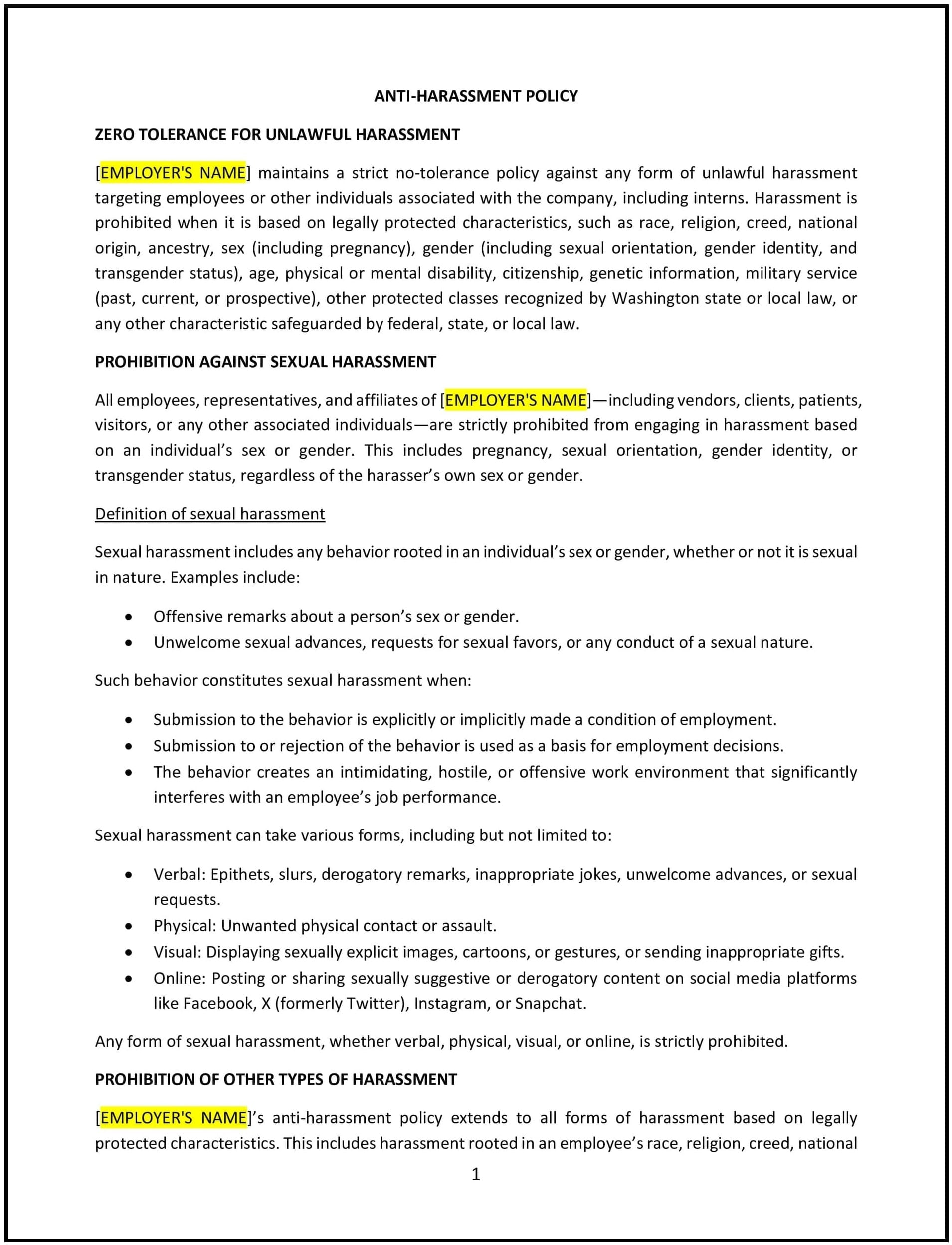Got contracts to review? While you're here for policies, let Cobrief make contract review effortless—start your free review now.

Customize this template for free
This anti-harassment policy is designed to help Washington businesses create a work environment free from harassment, discrimination, and intimidation. The policy defines harassment, outlines the company’s zero-tolerance stance, and provides a clear process for employees to report and address harassment issues. It also includes the company’s approach to handling complaints, investigations, and ensuring that employees are not subjected to retaliation for speaking out.
By adopting this policy, businesses can foster a respectful, inclusive, and safe workplace while complying with Washington state and federal laws on workplace harassment.
How to use this anti-harassment policy (Washington)
- Define harassment: Clearly define what constitutes harassment under the policy. This includes any unwelcome behavior, including verbal, physical, or visual conduct, that creates a hostile or intimidating work environment. Examples should cover harassment based on race, gender, sexual orientation, disability, religion, and other protected categories under Washington state and federal law.
- Set expectations for behavior: Establish clear expectations for employees’ behavior, emphasizing respect, inclusivity, and professionalism. The policy should make it clear that harassment, in any form, will not be tolerated, and all employees are expected to contribute to a safe and respectful workplace.
- Provide a reporting process: Establish a confidential and accessible reporting system for employees to report harassment. The policy should outline multiple reporting channels, such as HR, designated managers, or an anonymous hotline, ensuring that employees feel safe and supported in coming forward.
- Outline the investigation process: Clearly describe the process for investigating harassment complaints. The policy should specify how complaints will be handled, the timeline for investigations, and the company’s commitment to conducting a thorough, impartial review of all allegations.
- Address retaliation: Make it clear that retaliation against employees who report harassment or participate in investigations is strictly prohibited. The policy should ensure that employees can report issues without fear of retaliation or negative consequences.
- Provide consequences for harassment: Specify the potential consequences for employees found to have engaged in harassment, which may include disciplinary action ranging from counseling to termination, depending on the severity of the behavior.
- Ensure compliance with Washington and federal laws: The policy should comply with Washington state laws, including the Washington Law Against Discrimination (WLAD), and federal laws such as Title VII of the Civil Rights Act of 1964. The policy should also reference the company’s commitment to following legal requirements related to harassment and discrimination.
- Review and update regularly: Periodically review and update the policy to ensure it reflects current laws, best practices, and the evolving needs of the company. Regular updates will help maintain the policy’s effectiveness and relevance.
Benefits of using this anti-harassment policy (Washington)
This policy offers several benefits for Washington businesses:
- Promotes a respectful work environment: By addressing harassment proactively, businesses can foster a culture of respect, inclusivity, and professionalism, which leads to better employee morale and collaboration.
- Reduces legal risks: A clear and comprehensive anti-harassment policy helps businesses reduce the risk of legal action related to workplace harassment, discrimination, or failure to address employee complaints.
- Improves employee retention: A workplace where employees feel safe and respected is more likely to have high levels of employee engagement and lower turnover. Employees are more likely to stay with a company that values a harassment-free environment.
- Increases productivity: Employees who are not distracted or stressed by harassment are more likely to be engaged, focused, and productive. A safe work environment encourages collaboration and fosters innovation.
- Enhances company reputation: A company that takes a firm stance on preventing harassment demonstrates its commitment to ethical practices and employee well-being, which can improve its reputation both within and outside the organization.
- Promotes legal compliance: The policy helps ensure that the company remains compliant with Washington state laws, federal regulations, and best practices in preventing and addressing workplace harassment.
Tips for using this anti-harassment policy (Washington)
- Communicate the policy clearly: Ensure that all employees are aware of the anti-harassment policy and understand their rights and responsibilities. Include the policy in the employee handbook and review it during onboarding and at regular intervals throughout employment.
- Provide training on harassment prevention: Conduct regular training on preventing harassment, identifying inappropriate behavior, and fostering a respectful work environment. The training should also cover the reporting process and the importance of maintaining a harassment-free workplace.
- Foster a culture of respect: Encourage employees to treat one another with respect and to speak up if they witness harassment. The company should promote positive behaviors, such as mutual respect, open communication, and inclusivity.
- Respond promptly to complaints: Take immediate action to investigate and address harassment complaints. The policy should emphasize the company’s commitment to resolving issues quickly and fairly while protecting employees’ rights.
- Monitor the effectiveness of the policy: Regularly assess how well the anti-harassment policy is working, including gathering feedback from employees and monitoring any changes in the workplace culture. This can help identify areas for improvement and ensure that the policy remains relevant.
- Review and update regularly: Periodically review the policy to ensure it remains compliant with Washington state laws, federal regulations, and best practices. Update the policy as needed to address emerging trends and issues related to harassment.